‘It’s just intuition’ – Jason, with his girlfriend, besides an ancient stone around midnight, under the stars, Avebury.
To hell with alarms, or lack thereof. Mine’s not gone off, so the morning is like a firefighter’s scramble out of bed, leaping into a set of the nearest clothes, licking toothpaste round my mouth and hobbling out, half-shoed and hungry. Outside Pat’s place, I look on as a strung-out fella attempts to sleep whilst riding his bicycle. In his hand is a large sports store bag with his belongings. He stirs for a second, talks to himself, curses, wheels ahead a few steps, then dozes off again.
We’ve all been there, eh, victims of our misjudgements, an inability to say no… but sleeping on a bike?
Liberal attitudes towards drugs legalisation struggle when faced with situations where a person indulges in risky behaviour or becomes dependent on getting out of it, more than dependent on any particular drug (and alcohol’s one of the worst). He wheedles down an alley where I’ve locked my bike, then inexplicably reverses and returns to the street, where a phone drops out of his hand and shatters.
I get a cherry and a blueberry flapjack from the local East Street bakery, as I watch white-shirted office workers rush to work and a flower stall being set up. Cafes are opening and there’s a good trade this Friday morning. I cycle up past Bedminster’s Asda-McDonalds monstrosity, and over into the centre, passing the Temple Meads station and joining a very busy cycle route out of the city.
My route is eastward, piercing into the sleepy countryside east of Bristol. An unusually high number of intellectual and scientific discoveries originate here, and some of the most important religious sites on these islands are to be found in this part of the south-west.
Bath is my first destination. There’s a flat and well-signed cycle route paved over an old railway line, and though it’s far from the most direct route, it’s pleasant and easily navigable. Across the trail there are glimmers of cerebral, visionary and just plain strange graffiti. ‘You see but r blind’, looms one doorway, the outline of an eye beneath projecting some kind of vague intuition. In the land of the blind the one eyed man is king. On one bridge straddling a busy road, protest graffiti remains from the 2003 stop the war movement. ‘BBC Corrupt’ opines one. In Bristol not so long ago these same slogans were expressed again, against the BBC’s pro-Israeli coverage of the recent Gaza conflict. The route passes Fishponds then leaves the city, threading over some lovely countryside and besides a predictable number of steam railway enthusiasts. I cross an iron bridge which is just a shrine of strangeness. Besides more conventional political criticism (‘Terrorism: a word that controls our NATION!’) there are algebraic equations, mentions of ‘Merlins foci’, ‘Alternating a god’, ‘longitudinarianism’ and ‘binary eclipses’. There’s a combination of sincerity and wry humour at work here, but the place deserves a plaque and a preservation order: ‘welcome to the iron bridge … bye thanks for coming xxx’.
I reach Bath by way of its canal. It is surprisingly run-down. The depressing remains of what I later suspect were the Stothert and Pitt engineering company sit lankly on the canal. The company exported dock cranes all over the world until Robert Maxwell took over the company in 1986 and stripped it of its assets before going bankrupt. I follow New King Street down towards Bath’s distinctive golden Bath stone Georgian terraces, passing a Christadelphian chapel and, opposite, the house of William Herschel. Here on 13 March 1781 Herschel discovered the existence of Uranus, after following the progress of what he thought was a comet for several days. It was the first planet to be discovered by telescope, and the first new planet to be discovered since the astronomy of the ancients.
It’s such a modest location for this discovery, but one that matches Herschel’s modest character. He was professionally a musician, and his astronomy was self-taught. He resisted well-meaning suggestions to name the planet after himself, and instead called it georgium sidum, Georgian star, after King George III. The name was predictably unpopular overseas, and its more suggestive name was chosen from ouranos, the Greek god of the sky. His sighting of Uranus was accidental, honest (couldn’t resist, sorry…), as was his later discovery of infra-red radiation. The distinction between professional and laymen was less fixed then. Men and women from all walks of life could, provided they had sufficient access to personal wealth, explore their interests in the natural world and then share their findings.
Bath is immediately defined by its consistency and continuity of exuberant Palladian architecture, of a kind one sees at times in the West End, but achieved with more style and panache here. Just look around, feast one’s eyes! Yes, there are tourists, great throngs of them, but the town is a delight. It’s amazing how enjoyable urban spaces can 20th and 21st century town planners and builders have been turned away. The entire city is a UNESCO World Heritage site, and as I cycle round I begin to wish that I’d given myself a day for this town too. Still, an afternoon may just suffice.
I tie my bike up by Queen Square and pop into the Bristol Literary and Scientific Institution. I’m freely welcomed in and conversation flourishes. I talk to Bob and Paul, who work at the institute and who ask me to explain my doctoral research in the spirit of free scientific interest (Paul’s also a cyclist, which helps with the perks too). I’m handed free coffee after coffee and end up spending several hours here, talking and finding out about Bath’s scientific history.
And it’s surprisingly substantial. The Arabic notation for numbers and zero were largely imported into Europe through the translations of the 12th century translator and naturalist Adelard of Bath. During his life he travelled across Europe and the lands of the Crusades, acquiring Arabic and discovering the latest developments in Arabic geometry and mathematics. He returns to Europe where he translates many key Greek and Arabic works from Arabic to Latin, particularly Euclid’s Elements. From the way we count to the foundational geometric proofs underlying everything from architecture to computing, our way of life has been enhanced by this relatively unknown figure, Adelard of Bath.
Peoples have lived around Bath since pre-Roman times, attracted by its hot mineral springs. The Celts worshipped the goddess Sulis here, and later the Romans came and rebuilt their shrines for their goddess of wisdom, Minerva. They built a large and sophisticated spa complex which has remained in use ever since. In his 9th century History of the Britons, a fascinating fusion of Arthurian myths and astute observation, Nennius describes Bath as
‘surrounded by a wall, made of brick and stone, and men may go there to bathe at any time, and every man can have the kind of bath he likes. If he wants, it will be a cold bath; and if he wants a hot bath, it will be hot’.
Bath began to boom from the 18th century as the aristocracy were drawn towards the purportedly healing powers of its waters. Scientists settled and major discoveries occurred: William Smith produced the first geological map of Great Britain; Joseph Priestley discovered Oxygen; and Charles Moore discovered much about the dinosaurs whilst based here. A little beyond in Gloucestershire, Edward Jenner discovered vaccination and began to effectively treat smallpox. Intellectual and scientific discoveries were shared in small societies established from the mid-18th century onwards, building up small collections of books and artefacts for a collection of often wealthy amateurs. Later with the Museums Act these were absorbed into local collections. Many were vital intellectual communication channels of their day, bringing together leading scientists and thinkers to understand or debate various matters, like, for instance, the actual source of the Nile. Whilst I’m passing through Bath, Bob tells me about the 150th anniversary of an infamous debate between Richard Burton and Captain Speke. The debate was cancelled after Speke was found shot dead. Was it accidental, suicidal, or…?
After a morning like this, I’m feeling the spirit and openness of being a member of a Victorian intellectual society, debating the matters of the day with an air of haughty, disinterested confidence! All for free, and in wonderful, comfortable surroundings. Other members drift in and out. We talk, and I’m given directions to Eagle House, a nearby Suffragettes respite home in Batheaston, where trees were planted by suffragettes resting after incarceration in Holloway gaol.
I ride into Victoria Park, and see the Royal Crescent, a spectacular display of 19th century neoclassical pretensions, but achieved here to a degree like nowhere else. I’ve been to other spa towns like Leamington, Harrogate, Buxton, Tunbridge Wells, but none accomplishes something like this and on such a scale. Bob had shown me plans for an ambitious 19th century Queens College, an ambitious university structure that would’ve perfectly matched the mood of this intellectually confident and curious town. Had it been built, Bath’s name would no doubt be alongside Oxford or Cambridge in learning. But as a beautiful albeit very well-mannered city, it stands high with those two luminaries.
The town centre is lovely. Look up and about, and one glimpses enticing features all around. Even the regular chain shops, and there aren’t many, don’t feel as irksome. There’s a plethora of good independent shops, like the bookstores on Milsom street, and a number of curious crannies well worth exploring. I wander around with the Japanese tourists and dawdling pensioners, and talk to Ian, a Big Issue Seller and a Peckham native (his dog’s called Boycey!) He tells me that he likes the town (of course!), but misses London and its speeds. Like other Big Issue sellers, the rise to £2.50 affected trade negatively (‘now it’s only pensioners’, one of whom wanders up to us as we talk, a sweet and friendly lady, and strokes Boycey, and apologises for not bringing a treat). He thinks that it could rise to £3.00 after Christmas. ‘A dying trade’, he says, kind of under his breath. We wish each other well.
I continue on, looking at the reconstructed Roman baths, and a small ‘abbey’ which looks an awful lot like a cathedral… The town square is thronged with visitors and the mood is relaxed, though this seems like a place that you’d need some money to enjoy yourself in. I check out the 44AD gallery which Bob and Paul had pointed me to. There’s an exhibition of discarded paper cups and artistically adjusted bits of paper, alongside some childish drawings. Is art simply whatever someone puts in a gallery? Well, even if one doesn’t enjoy such exhibitions, if they trigger discussion then perhaps that’s something.
After that I cycle out of Bath, a small but lovely town. It’s a bit too sweet for me, a bit too quaint. Its scientific exploits, yes, certainly! But the chocolate box effects otherwise? I’m not sure. I certainly couldn’t live there. Like Bristol, it’s just that bit too nice…
I follow a road out to Bathwick, then join up with the canal for a short while, passing narrowboats blocking up the scene. It’s a lovely afternoon. I pass a small toll point and take the road up into the hills, disappearing up Steeway Lane, a real hike of a country lane but flanked in bushes of juicy and ripe blackberries. I spend a while talking with one picker, a bearded gentleman with a large wicker bag. We talk about our plans – crumbles, preserves, jams, ice cream – ‘I can’t believe mothers just go and get them from the supermarket’. Further up the road I pass bushes filled with blackberries, sweet and delicious. It’s such a pleasure stealing from nature’s larder.
The roads are delightful. I pass into Wiltshire, and the more agriculturally-intensive nature of the landscape shows through. But at this time of year there’s a real variety in the colours and textures of the fields. There’s the freshly picked corn, sitting in great sculpted wheels which appear like they’ve stood the same way for aeons. Then in other fields the corns’ been reaped, and it’s a spiky scene of straw-yellow bands. Or there are fields freshly tilled, their soils almost a reddy-orange in the sun. And then there are the fields of grasses, ready for sheep and cattle to come and eat. It’s lovely riding through Wiltshire, on a sunny and sedate afternoon gently approaching paradise.
I ride through field after field. The rare village I pass feels unmarked, off the map. Who needs keep count of these things? These lands look like they’re still passing through generational hands. They don’t need a reminder of where a settlement starts and ends, the boundaries of land are known in a far more tangible way with them. Few are the walls and fences, few the signs. I’m pushing deeper and further into the unknown, no longer checking the map, happy to get lost for a couple of hour if it means I can then find my way again in this beautiful and largely flat countryside.
I pass Grittleton with its expensive school, then through a series of fields and hamlets, through villages like Foxley, with its delightful wildflowers, drystone walls and sleepy cottages. It reminds me of what I’ll call the ‘Grasmere effect’, of urban town planners naming the most bland and ugly streets after regions of the Lake District, Yorkshire Dales or other rural idylls. Back home I live close to Foxley road, perhaps the most un-Foxley like place I can think of. And here, its inspiration. Yes, I suppose I see it now. I join the Wiltshire Cycle Way, a well-signed route which eventually gets me to the market town of Malmesbury.
I’m told it’s the oldest borough in England, and its charter survives from 808. But my interest here is in its scientists and philosophers. The political philosopher Thomas Hobbes was born here in 1588, the year of the Spanish Armada. An ardent supporter of the Royalists during the Civil War and profoundly pessimistic about the supposed benevolence of human nature, Hobbes is remembered now for considering human nature as ‘a war of all against all’, and our lives ‘nasty, brutish and short’. But his pessimism was intended as a realistic appraisal of what happens in any society when its government and laws collapse. Like Machiavelli, Hobbes’ counsel is that one acts wisely when one assumes that others will act egoistically. This is no moral taint, but a feature of human nature. Each of us desire power, that is, control over a future good, and our lives are one of continual motion. Individuals will be largely incapable of acting for a common interest unless they are compelled to.
Rather than give in to human egoism and let the winners win by virtue of their power – the kind of veiled social Darwinism that explains the policies of Conservatives and their business backers – Hobbes argued that humans function best when working together and assisting each other. Though his agenda is always, ultimately, to reassert the need for a strong king, I’ve at times read in his writing some subtle and powerful arguments for a popular constitution.
‘The greatest of human powers is that which is compounded of the powers of most men, united by consent in one person, natural or civil, that has the use of all their powers depending on his will, such as is the power of a commonwealth, or depending on the wills of each particular, such as is the power of a faction or of divers factions leagued.’
There’s a Philosophy festival planned for some dates in October in Malmesbury, but as I sit opposite the award-winning ‘Thomas of Malmesbury’ butcher and eat my water-and-granola besides the traffic, there’s no-one around to debate democracy or Hobbesian heresies. A shame! Much of what the British knew of their own early medieval history was produced by William of Malmesbury, another local who lived and wrote here during the 12th century. And further afield, there’s John Locke, another fascinating English philosopher and near-contemporary of Hobbes born in nearby Wigton. ‘[T]here is only one thing which gathers people into seditious commotion, and that is oppression’, said Locke once, in A Letter Concerning Toleration. And I fear I may be oppressing the reader’s toleration by wittering on any further. Let’s take a look around Malmesbury.
I see evidence of a small but lively community, of the kind Londoners form half-baked dreams about moving to. There’s stand-up comedy and classic film nights held at the local parish hall. Just look at the buildings! Such a variety of bricks, sizes and styles, each resting against the other, time zones sandwiched against one another. I cycle down towards the Co-op to get some supplies. Even the service is friendly and languorous! I get talking with the cashier and the people in the queue about Wiltshire and its pleasures. Such conversation would receive passive aggressive huffs and foul language in the express stores of London, but here it becomes a group discussion. I’m directed to the town’s most popular pub and warned of the area’s gentle friendliness, though such warnings have been received too late. I head into the small town, and peer around.
There’s an impressive partly-ruined abbey with a typically surprising history. Back in the early 11th century one of its towers was the launchpad for an early experiment in human flight. A brave (or bored) monk named Eilmer attached wings to his arms, leap into the air, and, after managing to somehow glide a furlong, crashed down to earth and broke both legs. Nearby is an ornate garden with a ludicrously homoerotic statue. It is run by two nudists, and even the casual and passive toleration of this, among the begonias, chrysanthemums and cream teas, feels ridiculously yet characteristically English.
I get talking to a young nurse outside, only in the job a week, having gone through a diploma. She’s unsure of what lies ahead, but is excited. I gently ask about morale in the profession and cuts but she hasn’t seen evidence of things worsening. The discontent and social difficulties I’m used to seeing and hearing about aren’t visible out here in the more affluent shires. Just a gigantic boredom…
I pop into the Smoking Dog pub following a local tip and have a couple of drinks. I’m talking to a plasterer about the area, and about his life. He’s from Malmesbury and has always lived here, and truthfully is the first person I’ve met in the village with a strong accent of any kind, a thick West country brogue. He tells me about what’s important to him, which moves from his inability to settle in one place and need to continually travel to new places and do new things, to his young daughter, and his partner from London who just loves the place, to a near death-experience, his juvenile mistake of wearing a Man United shirt in Leeds city centre. ‘I was getting abuse from people’s windows. Then we went into this pub, me and my two mates, they’re not into football like, and it just goes silent. Dead. Everyone looking at us. We can’t walk away.’ Somehow, by charm or admiration of his bravado-idiocy, he ended up getting his photo took with the landlord and making some good mates at the bar. ‘But never again after that! I could’ve been stabbed!’
I head out through the south end of Malmesbury and take a road east towards Wootton Bassett. I pass a large white horse etched into the hillside, one of several across Wiltshire, then ride through Brinkworth, the longest village in Britain apparently, but a collection of buildings dotted around with no continuity whatsoever. Still it’s lovely riding. There’s no poverty here, an abundance of green spaces, good quality buildings and care in producing them, artisan details, obvious community activities happening and being advertised. It’s a marked contrast to the poverty and deprivation of Newport and much of south Wales, or the north of England more broadly. There are some gated homes, strange and unlikely, but otherwise it’s lovely. And there’s still the yummy blackberries and blackcurrants growing on the bushes which I stop and pick at greedily.
I make it to Wootton Bassett, just on the outskirts of Swindon. Any further into David Brent territory and I might start having pretentions on returning to London… Not yet. It’s a small town that seems to still be hooked into its main village high-street. The atmosphere is friendly and welcoming, yet more multicultural. There’s a Chinese chip shop that I head into with the most gregarious welcome, as if I’m a lost friend. We talk about the area, pleasant to bring up a family, and they’re most relaxed talking about local gossip whilst offering to fill up my water bottles. Just lovely, like the Wiltshire landscapes, surprisingly gentle. The town has no obvious military connection, but between 2007-11 became known for its gatherings of mourners who would assemble to watch processions of British dead being taken from nearby RAF Lyneham to Oxford. Idiotic bigots like Islam4UK and the EDL both planned at various stages to hijack these gatherings with their own demonstrations, but ultimately little came of them. There’s no obvious acrimony left behind, and the village remains docile and still.
I ride out to Broad Town, then up through to Broad Hinton. The scenery remains rustic, rural and utterly lovely, a delight even in the setting sun and murmurs of traffic. I was warned in Malmesbury about the local Dyson employees making havoc on the roads, but the Friday evening ride is largely easy, the settlements stringing together like pearl beads on a necklace.






I reach Avebury, surrounded in freshly harvested fields. It’s a small settlement, twee and gentle, but surrounded by a large, majestic and impressive outer mound, and inside, two smaller inner ring of standing stones. The A-road politely threads through these and the village tries not to make a point of it, but somehow finds itself inside a major and substantial paleolithic religious site whose establishment is at least some four and a half thousand years old. There’s a pub called the Red Lion, a few homes with thatched roofs, pretty cottages, and only two shops I find (a local store and the ‘Henge shop’, the only concession to the pagan and druidic significance of the area). I pop into the pub for a half of Avebury well water and to refill my water bottles. There are leyline maps and bored married couples inside, and I begin to wander about what has drawn people here. I’m told at the bar about the ‘mad’ gatherings that occur here four times a year during the solstices.
The sun is setting. Realising that there’s little else I can get out of conversation here, I decide to pursue an experiment. I was schooled at Protestant and Catholic institutions, and through my reading and conversations have acquired some familiarity with the scriptures and tenets of Islam, Judaism, Hinduism and Buddhism. But paganism and druidism have no surviving canonical texts, nor would look to any for overriding instruction. Intuition and understanding of nature are emphasised, but so is the exploration of the imagination, enhanced through sensory self-deprivation, physical exertion, fasting, and psychedelic substances. My experimental gambit is to explore whether I can discover anything more about the place, or about myself, under similar conditions.
The area is so peaceful and deserted. I drop a tab of acid and begin to slowly and languorously walk around the outer ridge of the stones. The sun has set very gently, the rays welling up inside the clouds. I’m alone as I inspect each stone, and wonder how it was transported so far, at the years of its lichen, and so many, and the remarkable and varying shapes and forms of the stone. Some have small natural holes in where people have placed a penny, a bird’s feather, and a pretty string bow. I spy one girl meditating by one of the stones, and respectfully keep my distance.
I inspect each one with my hands and my eyes, exploring its contours, wondering about the people that struggled over decades to move them here, raise them onto these points. Ancestor worship, or astronomy, or tribal gatherings, or some mix of them all? Perhaps. I find a secluded place to tent by one very large stone and lie back and take it in. I write most of this entry (though since revised to check facts and quotes four weeks later), and watch the gloaming gently disappear. I trace a delightful array of shapes that the lights of passing cars leave on the foggyish skies this evening. My eyesight and hearing are temporally enhanced, and I hear the cries of owls and other birds with more concentration. It’s a lovely, peaceful place, Avebury. I’m alone tonight, but my solitude is peopled with a gentle, overbrimming happiness.
The experience is one of total relaxation. Every sense feels stronger than you can possibly remember when you’re relaxed enough to focus on one aspect of it. Perhaps the same is achieved in yoga. The mind feels so relaxed that it will allow itself to consider everything around it that is hard to explain – lights become stronger, smells more floral, tastes more intense. Dissassociating, to the happy point that all these possible combinations of senses become light and unimportant, a passing drama in the fleeting motions of matter. Just movements of energy, and attached to that, a warm feeling of bliss and peace.
In the end, I have discovered nothing much at all, though am probably more safe and self-composed than my average city pub tour. But I cannot sleep whatsoever. My mind has become obsessively fixated with its own thought experiment: if these stones could perceive, what might they have seen change in the preceding four thousand years? Every scenario is explored with a euphoric if exhausting imaginative rigor.
I decide to get up and wander around the circle again. It’s around midnight or one in the morning, and the stars are shining with an intense, eye-aching luminosity. I gaze up for what feels like aeons though is probably little more than a few minutes, when I’m suddenly shocked by something most worrying and unusual.
A small and dim torchlight is flickering towards me. I could keep resting by this stone, as they will not have been able to see me in my discreet location. But what a fright I’d give them! I decide to be sensible and announce that I’m there, and not to panic, and that I will leave imminently if I need to. (Is that so weird? Well it can’t be bad as how I addressed a group of drunk teenagers whilst camping in a sports field in Wymondham at the start of my journey: ‘don’t worry, I’m not a ghost!’ Now that did scare them witless…).
What results is perhaps one of the strangest but friendliest encounters of this trip. Jason and his girlfriend are two pagans who have travelled up tonight from Royston in Cambridgeshire. They’re out dowsing, they tell me. ‘It’s something eighty percent of people can do’, he assures, sensing my scepticism. They stand close to me and look at me with a combination of confusion and friendly bemusement. My senses are still disarrayed, and for around a third of the conversation I’m actually unsure whether his girlfriend even has a head – I cannot see it, until at last it appears into view. In retrospect I find it bizarre how calm I felt. You know the warning they issue to kids don’t you? Well…
‘There’s a lot of love in this place. It’s about marriage, fertility. Stonehenge to me feels about the past, about death and remembering.’
They describe their interest and attachment to the place with great passion. Jason tells me about St. Michael’s leyline which runs across Britain, and the overlap at Averbury with the Mary line, which together run ‘like a cortice’ as he puts it. They describe the womb-like barrows at nearby West Kennett with special significance. And this being a conversation among strangers, I share with them my travel stories. I tell him that I’m amazed by the stars, that I know little of these stones but have come here to find out if I could feel anything more about them, and their symbolic significance for the peoples of these islands. ‘There’s a feeling about the place I can’t put into words’. They smile. Jason compares it to the Tao, ‘you don’t need to know, just be silent’, as he summarises its instruction. ‘Mysterious things do happen here’. He tells me about a time when he and his friends were in a caravan near Stonehenge. He repeatedly qualifies that they were not high as he tells the story of a small white pea which appeared in the air from nowhere, rose to the top of the caravan, and then suddenly exploded, waking several sleepers. There’s some mysterious power emanating from the very rock where I’m resting, he notes, as the pair smoke on cigarettes and look around furtively.
I’m starting to tire, and the thoughts inside my mind have become too confused to untangle. I politely indicate my intentions to sleep and they continue on their perambulations in the distant dark. There besides the stone I rest my head and, eventually, fall asleep.






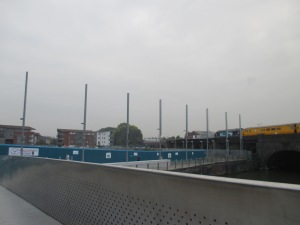

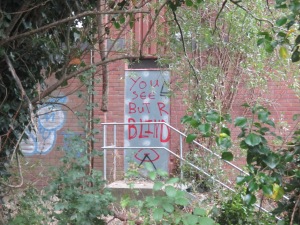





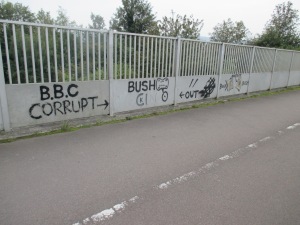









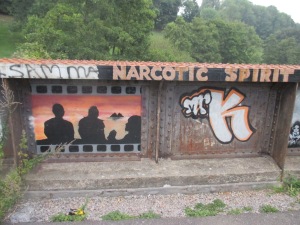











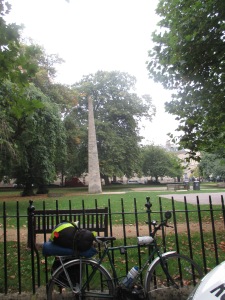











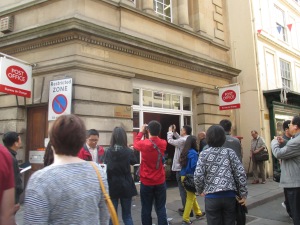




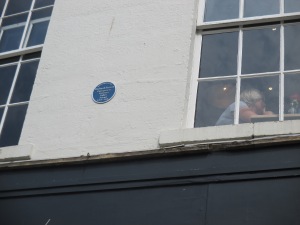






























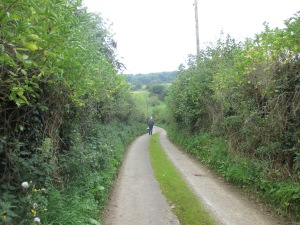

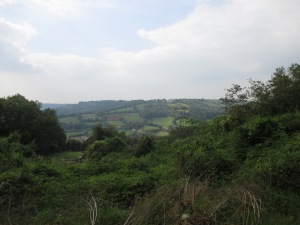




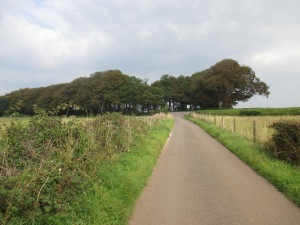



























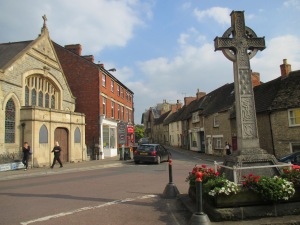

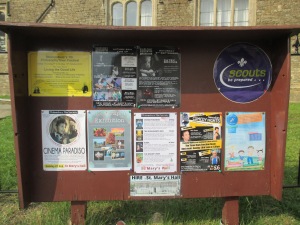


























































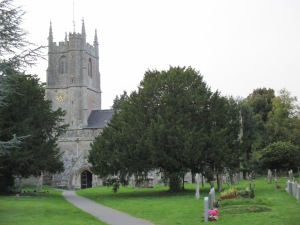







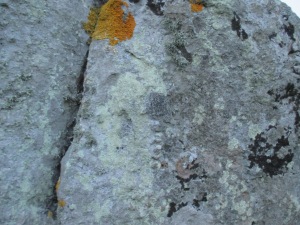












my goodness Dan-what an adventure amongst the stones-last time I took a tab of acid was at windsor free festival in 1974-can’t say it really agreed with me,but it looks like you enjoyed it. I enjoyed the solstice festival at stonehenge too about the same time.
I visited the naked gardeners in malmesbury as well this summer! Wonderful garden and statues.